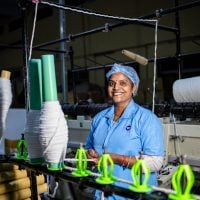Deadline: 7-Nov-22
The Challenge Fund for Youth Employment (CFYE) second Call for Solutions in Nigeria is now open for applications that will focus on expanding on the work currently being done by existing partners in the country by supporting scalable private sector led initiatives that can create employment opportunities for youth, particularly those in rural areas with lower levels of education and women.
In particular, CFYE is seeking:
- Business models that have been piloted, have proven concepts and are looking to scale.
- Innovative models that aim to address systemic bottlenecks and bring about improvement to whole ecosystems.
Funding Information
- The minimum CFYE co-investment is € 200.000.
The Challenge
Nigeria is the 7th most populous country in the world with over 200 million people. Approximately 60% of this number are young, energetic working-age men and women, majority of whom reside in the rural areas and have lower education levels. As of 2020, youth unemployment stood at 35%. A further 28% of young people in the labour force are underemployed (working 20-39 hours a week). As a result, a large proportion of people in the largest segment of the population are locked out of the productive economy because of the lack of employment opportunities available to them. Women are also negatively impacted, and research also shows that there is an over 5% gap between the rate of unemployment between men and women. This imbalance along gender lines may mean that more women are excluded from opportunities that make them self-reliant and able to contribute to economic development. Action is needed to stimulate economic growth and create employment opportunities for young people (especially youth in rural areas and women) and improve the decency of existing jobs.
Windows
- Tech-Enabled Jobs
- The Nigerian economy’s ongoing shift from its traditional agriculture-centered model to more technology-driven production and service provision models is largely driven by the increasing pressure being faced by Nigerian businesses to reduce operating costs, increase productivity, and improve customer experiences. Many activities that workers carry out today have the potential to be automated and several businesses are turning to technology to enable them to do this.
- Jobs for Women
- Women in Nigeria represent one of the largest pools of untapped labor, with 61.3 million women. However, they are underrepresented in the labour force with a gap of 13.42% when compared to men. The underrepresentation of women in the labour force and their growing participation in the informal sector has largely been linked to a number of factors,
CYFE Principles
- Actively Support Women
- CFYE strives to support equal opportunities for young women in the job market; CFYE’s ambition is to ensure that at least 50% of the youth reached in target countries are young women, and that women-led businesses are actively supported to apply for CFYE.
- Maximize Additionality
- CFYE will only support solutions and initiatives that would not be delivered within the same timelines, at the same scale, or delivering the same impact level, without support from CFYE.
- Clear Pathways to Employment
- CFYE identifies and supports initiatives that present a clear pathway to creating, matching and improving jobs. CFYE looks for solutions that present a deeper analysis of youth employment challenges and present a sustainable solution that will lead to sustainable business growth and employment outcomes.
- Collaboration with the Private Sector
- CFYE actively targets private sector entities or consortia involving a private sector entity. While CFYE welcomes ideas from any organisation, CFYE is looking for market-based solutions, tailored to the context of every country. CFYE prioritizes initiatives that are led by or actively engage private sector. These entities can be local or international.
- Youth Engagement
- Actively involving youth, and especially young women, is a prerequisite for being considered as a CFYE partner. Interventions should demonstrate how youth were involved in developing the proposed solution and how these solutions are likely to contribute to the goals and aspirations of young people.
- Sustainability
- As part of the design of a project/investment, prospective Implementing Partners will be required to demonstrate how their initiatives will become independent of external funding as part of their business case. It is of importance that projects have the necessary means to sustain their job outcomes beyond CFYE’s funding.
What they’re looking for?
CFYE takes a holistic approach to assessing the concept notes and business cases received. CFYE evaluates the proposals based on a detailed criteria that considers the technical design, delivery feasibility and associated commercial proposal. Key elements of CFYE’s evaluation and selection criteria are given below:
- Additionality: Will your project be able to reach the same goals, within the same timeframe and with the same quality without CFYE’s funding?
- Business Model: Can your idea demonstrate commercial viability in a competitive market environment, to create the highest value of returns to its stakeholders?
- Targets & Impact: Are you proposing ambitious and realistic job targets which are clearly aligned with CFYE employment outcomes?
- Scope & Pathways to Employment: Is your project able to layout a defensible and logical theory of change addressing the key challenges identified and leads to employment outcomes?
- Social Impact Aspects: To what extent do you understand and center your initiative around the true needs, challenges and aspirations of the young women and men you intend to work with?
- Sustainability, Scale & Resilience: Is your project likely to create scalable positive impact beyond CFYE’s contribution?
- Value for Money: Are you proposing reasonable and justifiable cost drivers and cost per job?
Eligibility Criteria
The following eligibility criteria will apply:
- Principles: Should be able to adhere to CFYE’s guiding principles & priorities.
- Exclusion Criteria: The project and organizations involved in delivering the project must pass the FMO exclusion criteria.
- Applicant Eligibility:
- CFYE strongly invites applications from private sector companies, including business accelerators and impact investors, as CFYE believes that private sector involvement is the most effective way to develop and test market-based solutions that respond to the challenge of youth employment.
- CFYE actively welcomes partnerships or consortium responses to this challenge.
- Non-profit entities are also welcome to apply, but they must apply in consortium with a private-sector partner with confirmed labour demand as the lead applicant.
- CFYE strongly prefers to work with fast-growing small and medium-sized enterprises (SMEs). The applicant needs to be in their scale up or growth stage. Activities presented in the projects/solutions need to be tested concepts
- Local Presence: The lead organization or at least one of the consortium partners, has a local operating presence in the country.
- Job Type: Jobs may focus on waged employment, dependent self-employment or self-employment. The jobs created, matched or improved must be for youth aged 18-35 years. The proposal must demonstrate that the aspirations and requirements of youth have been taken into consideration in the design of the concept.
- Decency of Jobs: For jobs to qualify as “decent”, basic requirements include an average monthly income of the minimum wage requirement of N30,000/ month. Jobs should be maintained for at least 6 months and should be in compliance with the labour laws of Nigeria.
- Total Targets:
- The minimum employment impact per project will be 1000 jobs within the project timeframe which is a maximum of 2 years.
- The project must meet the minimum eligibility criteria for job targets through a combination of CFYE categories: create, match or improve.
- There should be a clear Pathway to Employment in the project approach. CFYE will not support training-only projects.
- Employment creation, matching or improvement (of jobs) must be a direct outcome of the project
- Projects need to be focused on either tech-enabled jobs or jobs for women.
- Women Targets: Of the total youth employment created, matched, or improved;
- Window 1: at least a third (33.3%) should be for women. However, larger beneficiary targets will be regarded favorably.
- Window 2: 100% should be for women
- Leverage & CFYE Contribution: The applicant’s co-investment must be at least equal to the contribution requested by CFYE. The minimum CFYE co-investment is € 200.000. Sources of co-funding have to be approved based on the guidance provided.
For more information, visit https://fundforyouthemployment.nl/call-for-solutions-nigeria/









































